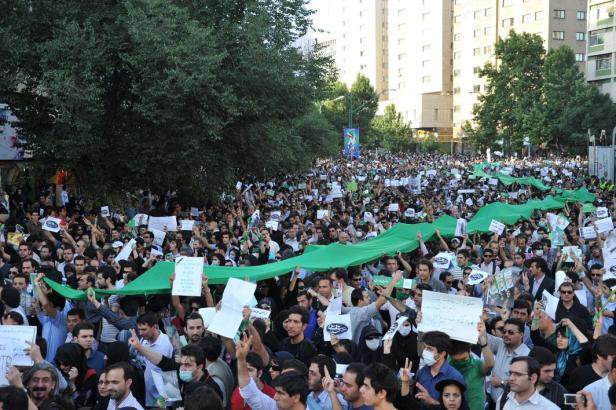 photo credit: Milad Avazbeigi/mangostar/wikimedia
photo credit: Milad Avazbeigi/mangostar/wikimediaProtest crowds gathered in Tehran during demonstrations in 2009.
It’s been two weeks since Israeli forces surprise-attacked Iran, starting a rapid escalation that's since drawn in the United States.
The conflict has stirred many emotions in Iranian immigrant households, across the US. including right here in Sonoma County.
Shari Sarabi is an Iranian American restaurateur who runs and owns Healdsburg’s Baci Cafe and Wine Bar.
Sarabi said he hasn't been able to get in contact with family in Iran for the past 14 days.
"All the communication is kind of lost for a little bit, for [the] time being," Sarabi said. "They turn off the internet, they turn off the telephones."
Although Sarabi hasn’t been back to Iran since he left in 1968, he said he still feels deeply connected with his homeland.
He still celebrates Nowruz, the Iranian New Year, speaks Farsi with friends and family, and he said all of his memories of his birth country are positive.
"I had couple opportunities to go visit home," Sarabi said. "And I realize that if I go, I'm going destroy this vision that I have in my mind. So that's probably one of the main reasons I've never gone there because of all the problems around the world with politics, religion. A lot of mix [and] match, and that's what causes a lot of problem, you know?"
Arman Pahlavan is a lawyer and a proprietor at Geyserville's Starlite Vineyards.
He was born in Iran and emigrated to the United States in 1977, and like Sarabi, Pahlavan hasn't returned to Iran since he left.
"I consider myself as an Iranian-American, or you know, really having both identities," Pahlavan said. "I was born in Iran and I've never had the opportunity to go back to Iran, so my memories are really childhood memories at best."
Asked what it means to be Iranian American during a time of global scrutiny, Pahlavan said he has less fear of experiencing prejudice now compared to past conflicts, like the 1979 Iran hostage crisis.
"I don't feel that there's a target on my back," Pahlavan said. "I feel that there's a...general understanding of what the right thing to do and what the wrong things to do are."
At the same time, Pahlavan said he also recognizes who actually has to endure the reality of the war.
"In these wars what happens, the infrastructure gets taken out and people suffer at the end, not necessarily the governments," Pahlavan said.
"Sarabi echoed a similar sentiment, and feels that the war is being driven by greed and power struggles rather than ordinary people’s needs.
"Everybody wants to have peace at the end of the day," Sarabi said. "Nobody wants to hurt anybody...you can't be angry unless it's for personal benefit and that's the problem, you know?"
"Overall, I'm hoping that everything will settle down, they come to their senses and then they sign some sort of a treaty or peace," Sarabi said.
As of Friday June 27, a fragile ceasefire between the U.S., Israel, and Iran continues to hold.

 Live Radio
Live Radio




